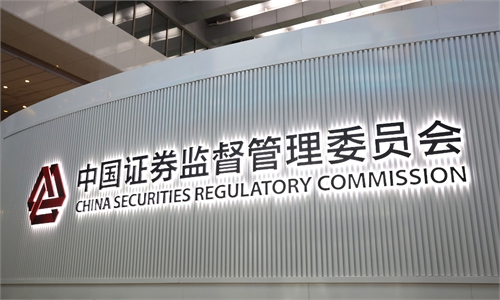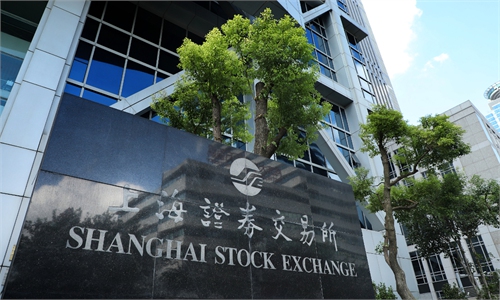From bond to stocks, China's financial doors are opening wider
Appeal of mainland assets to increase further for foreign investors

An aerial view of Lujiazui, a financial district in Shanghai File photo: VCG
In spite of economic pressure China is currently facing as a result of epidemic fluctuations and other factors, China's pace of financial market opening-up is progressing at a vigorous pace across a range of areas ranging from bonds to the mainland-Hong Kong stock connect program.
One of the latest examples of such opening-up efforts is a set of new rules for foreign investors funds in China's bond markets, which were launched in November and are expected to come into effect at the beginning of next year.
Issued following rollout of another document in May that is focused on further facilitating foreign institutional investors' investment in China's bond markets, the new rules provide unified management rules for offshore institutional investment in China's bond markets on issues like capital accounts, fund receipts, payment, and statistical monitoring.
The new rules also make it more convenient for overseas investors to invest in the mainland bond market by scrapping some restrictions which include the maximum number of counter parties for foreign exchange derivatives transactions.
Bond market opening
Observers have contended that the launch of the new rules is another example that China's bond market opening-up process is gradually evolving from just opening in scope to opening in depth.
"The focus of [opening in this area] is upon further increasing the convenience of offshore institutions' participation in China's bond market by broadening the range of [products] they are allowed to invest in. It is conducive to enhancing the willingness and enthusiasm of overseas institutions to participate in China's bond market, attracting more foreign capital to China, and reflects China's determination to promote the opening up of the bond market," Dong Dengxin, director of the Finance and Securities Institute of Wuhan University of Science and Technology, told the Global Times on Tuesday.
Yang Delong, chief economist at Shenzhen-based First Seafront Fund Management Co, said that China's bond market is still not big in terms of market scale or turnover compared with mature markets like the US, and therefore it is very important for the domestic bond market to increase "communication" with international markets.
"Opening up is a general trend and an important step for China to integrate into global financial markets," he noted.
According to Yang, introducing in more of overseas capital into mainland bond markets will not only replenish additional liquidity for the sector, but can provide opportunities to study overseas investors' investment experience.
"Against the background of China's realization of international and domestic double circulation, as well as the background of promoting economic recovery through active fiscal policies, expanding the openness of domestic bond market surely brings benefits," he said.
Orderly opening
Opening up the bond market to offshore investors is just one aspect of China's financial opening-up. In fact, China's efforts to open up the financial sector covers many areas and are as ironclad as in 2021, when the country has faced a relatively strong wave of economic pressure amid the coronavirus induced volatility.
In December, the securities regulators in mainland and Hong Kong announced that they had agreed in principal to expand the scope of the eligible stocks under the mainland-HK stock connect scheme. That means eligible foreign companies listed in Hong Kong will be included in the stock link program as well.
In November, Singapore debuted the first exchange-traded fund giving investors exposure to Chinese tech stocks via a similar vehicle in Shenzhen.
China recently also launched reforms on Delivery Versus Payment (DVP), a global practice under which the settlement of stocks and cash occurs simultaneously.
To some extent, those measures are in line with China's policy direction of systematically opening up the financial sector over recent years, with a number of financial opening measures being rolled out ranging from expanding quotas for the stock link program to scrapping restrictions of the Qualified Foreign Institutional Investor system.
"The message that China has delivered to foreign capital is very clear: China is continuing to implement two-way opening to smooth the channels through which foreign capital enters China," Dong said.
Under China's consistent efforts to advance financial opening-up, the appeal of China's financial assets is becoming a source of attraction for foreign investors and overseas capital's participation in mainland markets. According to data provided by the China Central Depository & Clearing Co, the settlement volume of overseas institutions participating in domestic bond transactions through CIBM Direct and Bond Connect increased by 56.73 percent and 48.84 percent in November compared with October.
Meanwhile, more and more foreign financial companies have laid out plans or actions to invest in mainland's financial market. For example, the Standard Chartered Hong Kong has applied for a brokerage license from mainland authorities, to which China's securities regulators have consented.
Yang predicted that China would continue to roll out policies to open up its financial sector in the year of 2023, still focusing on opening up the bond market further by facilitating the inflow of foreign capital.
He also predicted that more international rating agencies may include mainland bond market into their international bond indices in 2023, so that China's bond market will better integrate into the international environment.



